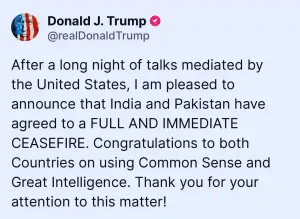ISLAMABAD: US President Donald Trump announced that India and Pakistan have agreed to an immediate and complete ceasefire, following US-mediated talks.
According to the details, Posting on Truth Social, Trump stated, “I’m thrilled to share that, after a night of US-led discussions, India and Pakistan have committed to a full ceasefire, effective immediately.”
He congratulated both nations, saying, “Kudos to India and Pakistan for their wise and intelligent decision.”

Deputy Prime Minister and Foreign Minister Ishaq Dar affirmed that Pakistan and India have committed to an immediate ceasefire.
In an X post, he stated, “Pakistan has consistently worked toward regional peace and security, while steadfastly upholding its sovereignty and territorial integrity!.
In a conversation with a private TV channel, Ishaq Dar said that war does not solve anything. At 4:30 PM, Pakistan and India agreed to a ceasefire. He said, “We stated that we are ready for a ceasefire. If India commits any aggression, we will respond.”
He added that he is grateful to the countries that contributed to the ceasefire. Diplomatic efforts continued throughout the day, after which a ceasefire was agreed upon.
He further stated that although the agreement was recognized yesterday, Pakistan defended itself vigorously and responded to India in a dignified manner. Pakistan has always made efforts for peace in the region without compromising its sovereignty and territorial integrity.
Pakistan Launches ‘Operation Bunyan Marsoos’ in Retaliation, Strikes Key Indian Military Sites:
Pakistan has launched Operation Bunyan Marsoos in response to Indian actions, targeting several military sites in India. The operation began at dawn with Fatah missiles, which have a range of 120 kilometers and advanced navigation systems, according to the Inter-Services Public Relations (ISPR).
ALSO READ
KP govt announces relief package for martyrs, injured of Indian aggression
The targets included airbases in Udhampur, Pathankot, and Adampur, as well as a BrahMos missile storage site in Beas and an S-400 air defense system in Adampur. Pakistan’s JF-17 Thunder jets reportedly used hypersonic missiles to destroy the S-400 system, valued at $1.5 billion.
Other sites hit included airfields in Suratgarh, Sirsa, Bathinda, Halwara, and Akhnoor, along with a military intelligence training center in Rajouri and Nowshera, a brigade headquarters in KJ Top, and a supply depot in Uri.
Artillery positions in Dehrangyari and several posts along the Line of Control, such as Rabtanwali, Dhin, Pathili Top, Khawaja Bhik Complex, and Sankh, were also destroyed.
Security sources said a cyberattack disabled 70 percent of India’s power grid, and several Indian websites, including the BJP’s official site, were hacked. Pakistan’s military also jammed an Indian military satellite, affecting its operations.
Media reports suggest Pakistan targeted these sites because they were used to attack Pakistani airbases, civilians, and mosques. Security sources stated that the operation sends a clear message that Pakistan will not compromise on its sovereignty or national security.
ALSO READ
IMF approves $2.3 billion for Pakistan despite India’s objections
They added that Pakistan’s armed forces have dealt a significant blow to India’s military, with the destruction of the Uri supply depot being a major setback.
Pakistan’s military continues to target Indian posts along the Line of Control, including Chhao Gali, Lal Jan, Islamabad, and Sokajabra in the Pando and Leepa sectors, as well as Qila Dheer, Green Plateau, and Jungle One in the Pir Kanthi and Dhodi sectors.
The ISPR had previously warned India to prepare for a response after its actions. Lieutenant General Ahmed Sharif Chaudhry, Director General of ISPR, said India fired missiles at three Pakistani airbases, but Pakistan’s air defense system neutralized them, and all air force assets remain safe. He added that Pakistan has electronic evidence of where the Indian missiles were launched.











